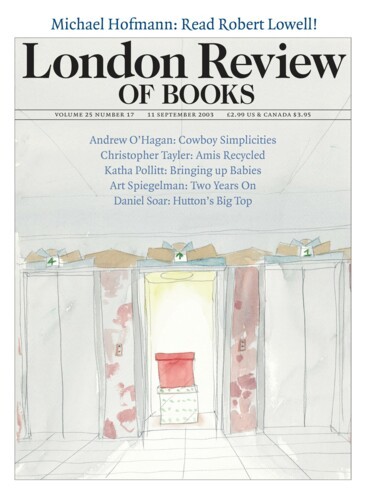Martin Amis doesn’t like journalists (if you didn’t know that already, you will now, having read Christopher Tayler’s review a few pages ago). This doesn’t stop journalists from loving Martin Amis. When the Man Booker Prize longlist was announced last month, reporters were delighted to see his name on it. Peel it back, and underneath appear the words: ‘For instant literary news, just add water.’ The online wing of the BBC had as their headline: ‘Amis and Atwood lead Booker list.’ They might as well have said that Amis and Atwood have names beginning with ‘A’, but never mind that. ‘Amis survives hatchet job on day of the long knives for other star writers,’ the Guardian succinctly announced, while the Times went for: ‘Amis defies critics with Booker nomination.’ (Their logic was a little flawed: being longlisted for the Booker doesn’t automatically annul negative criticism.) Even the LRB is concocting a few column inches out of the story.
The highest profile hatchet job on Yellow Dog was administered by Tibor Fischer in the Daily Telegraph. It’s been widely quoted, so you can skip the next sentence if you’ve heard it before. If you haven’t, here’s the opening and close of the killer paragraph: ‘Yellow Dog isn’t bad as in not very good or slightly disappointing. It’s not-knowing-where-to-look bad . . . It’s like your favourite uncle being caught in a school playground, masturbating.’ As you can tell from the style, Fischer is a longtime Amis fan. He owns a first edition of The Rachel Papers which he bought when it came out in 1973: Fischer was on the 1993 Granta Best of Young British Novelists list, so he’d have been an impressionable teenager when Amis first came crashing into his consciousness. Amis, you might say, has been an influence on Fischer’s writing. This is presumably what the Melody Maker review of his second novel, The Thought Gang, had in mind when it said that ‘Fischer pisses on Self and Amis.’ The piece in the Telegraph adds another dimension to this phrase, which features as one of the puffs on the back of Fischer’s new novel, Journey to the End of the Room, published on the same day as Yellow Dog. And in terms of media attention, Amis has, predictably, been pissing on Fischer, who’s in the limelight only by virtue of pissing on Amis.
You might think this is all rather unseemly, but we haven’t even got to the most shocking bit: which is that, as plenty of commentators were quick to point out, the pisseurs share a publisher. Well, sort of. Amis is published by Cape, Fischer by Secker – two of Random House’s dozen or so UK imprints. But even if the association were closer, why should that place Fischer under any obligation of restraint? What better sign of a hostile critic’s probity could there be than that he and the author under scrutiny share a benefactor? The most striking thing about Fischer’s attack on Amis, however, is that it caused such a fuss. The TLS called the assault ‘hubristic’; the Daily Mail and Sunday Times put it down to envy. All of which may be right, but that doesn’t mean that Fischer is necessarily wrong. The reaction to his piece suggests that the norm is a complacent atmosphere of mutual congratulation,* as novelists tread warily around each other on the interminable circuit of festivals, prize-givings and other literary gatherings. It’s dangerous to slag someone off, because even if you don’t share a publisher or an agent, you might find yourselves sharing a platform at a reading in Cheltenham or Hay-on-Wye. There are novelists out there who’ll puff anything that moves, and plenty that doesn’t – an exercise of numbing pointlessness. Barely a week goes by without a work of fiction arriving at the LRB on the cover of which it is proudly emblazoned that, in the opinion of Jonathan Franzen (for example), this book marks the arrival of a remarkable/distinctive/unique/major new voice. Most of them don’t.
The praise of a critic who doles out only praise is worth less than the praise of a critic who is sometimes prepared to find fault (assuming this is done with a modicum of intelligence). Ian Jack, the editor of Granta, writing in the Guardian last year, came up with the following paradox: ‘Nobody who has struggled in front of a screen or paper for three years deserves a pasting written in half a day by a 23-year-old, though the pasting might be justified in terms of what exists on the page.’ Forgetting for a moment the brief time this theoretical pasting took to compose and the age of the paster (would it be more acceptable coming from a 63-year-old?), the second half of Jack’s sentence decisively negates the first. Especially if the book in question is being lavishly praised elsewhere. Of course, if you’re its author or publisher, or the author’s best friend, you’ll feel differently. But then, shouldn’t Jack spare a thought for the feelings of those 23-year-olds? An exacting critic keen to reclaim the moral high ground could do worse than remember Lindsay Anderson’s justification for the savagery with which certain films were attacked in Sequence: the movies ‘hurt us’, he said, ‘as much as our comments hurt their makers’. Just so long as you don’t start to believe it’s true.
Send Letters To:
The Editor
London Review of Books,
28 Little Russell Street
London, WC1A 2HN
letters@lrb.co.uk
Please include name, address, and a telephone number.

